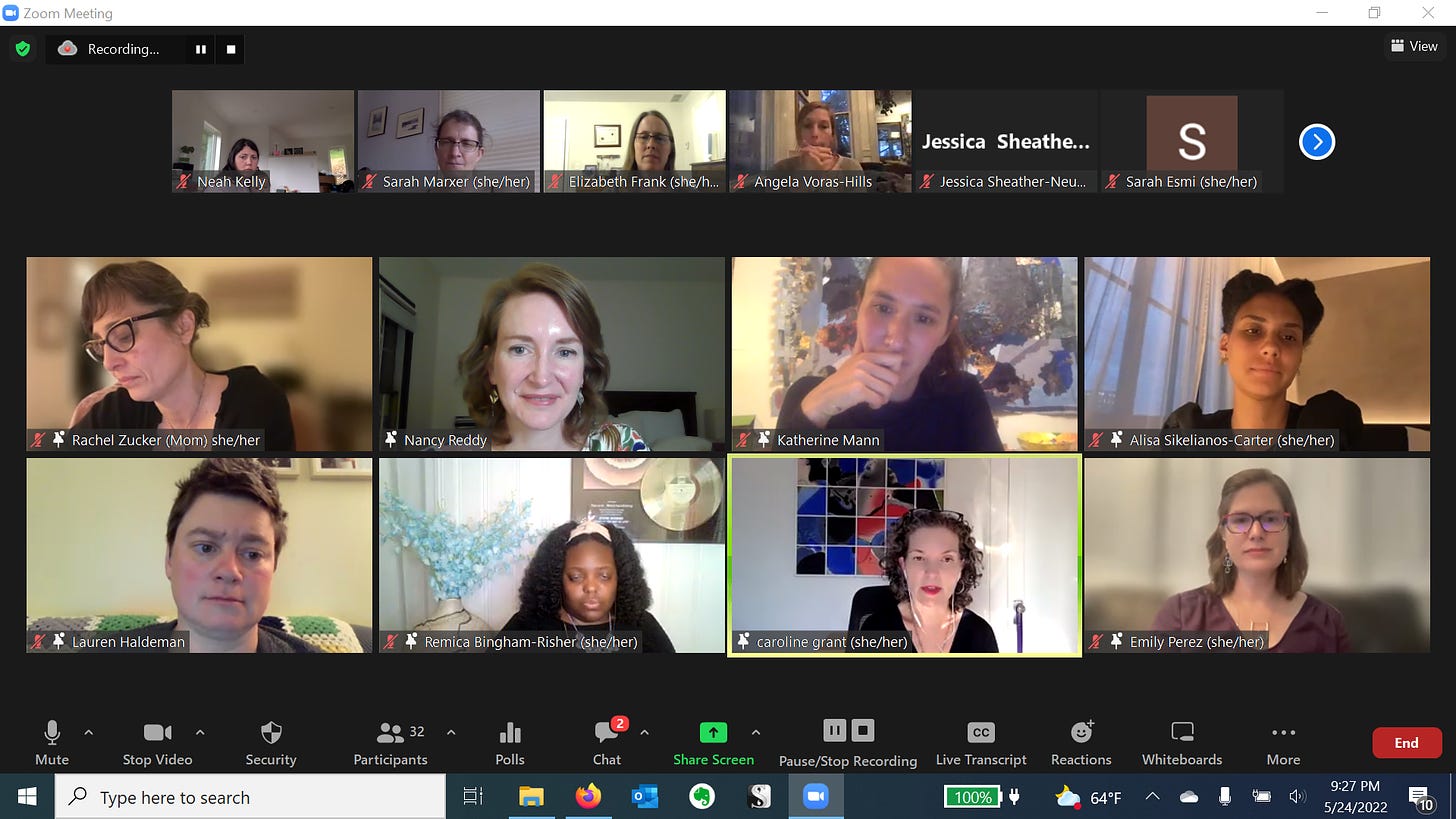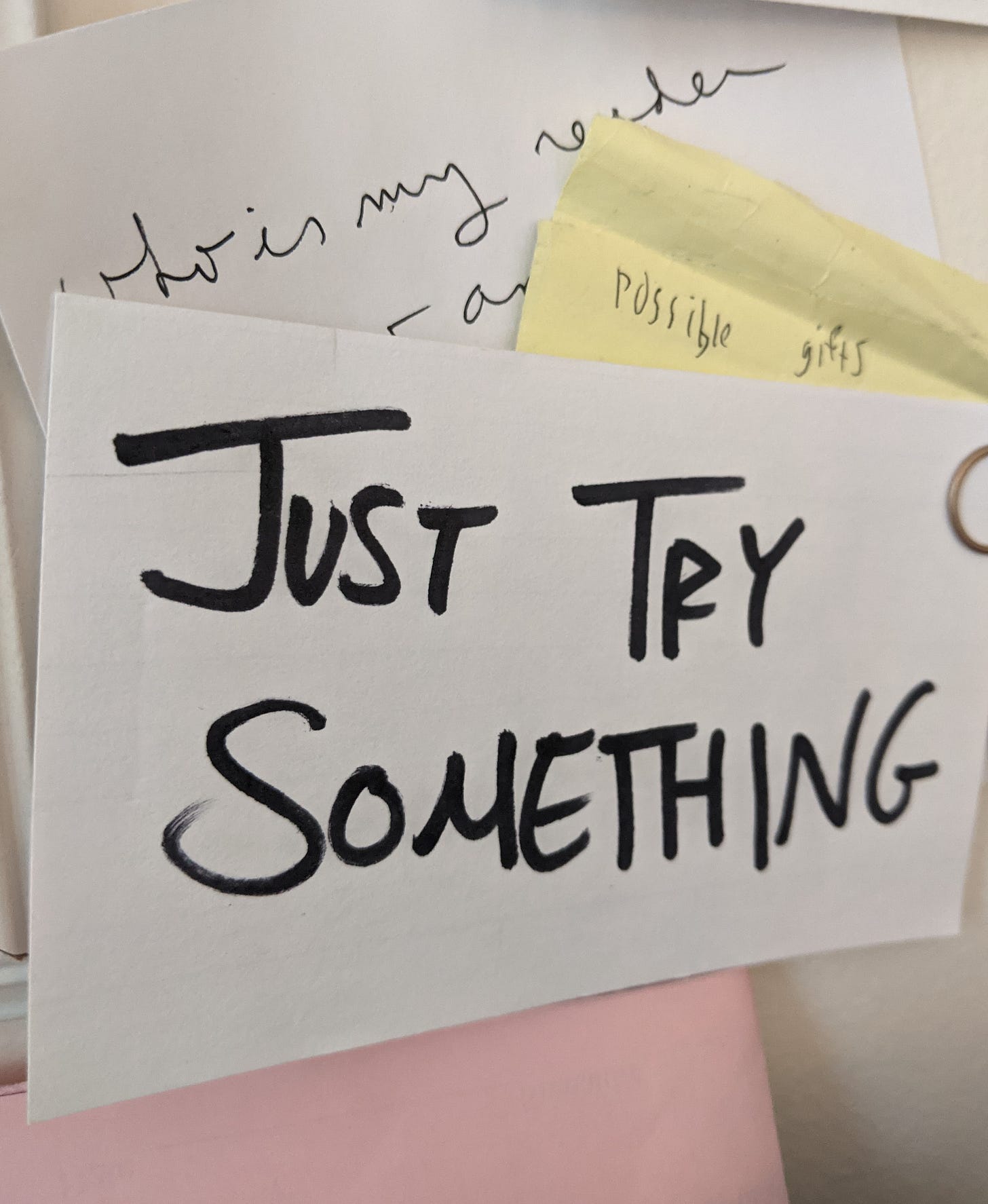

Discover more from Write More, Be Less Careful
who cares if you're writing?
setting intentions for June + strategies for accountability
I’ve been thinking (again, always) about accountability and writing lately, and specifically this question: who cares if you’re writing?
And I don’t mean that in an unkind way. Most of the time, I’m the only one who cares if I’m writing, and that’s okay. But it can really help to know that someone’s going to ask how your work is going, or if you’re making space for writing.
In the years I taught high school, one way I kept writing was signing up for workshops through Inprint’s Teachers as Writers workshops. The workshops were generally good to great, but what I’ve realized more recently was important about them, beyond the instruction or the feedback that I got, was that they created a space where I could see myself as a writer. All week long I was Ms. Reddy, telling kids to tuck in their shirts and spit out their gum, grading endless stacks of vocab quizzes, but on those Saturday mornings or Thursday evenings in the Inprint house, I was a writer. If I wasn’t writing, if I didn’t have something to pass out when my turn for workshop came around, those people would know.
As we head into June, I’d encourage you to think about how you can ensure you’ve got at least one person in your life who cares that you’re writing. This doesn’t have to mean sharing your work or asking for feedback—it can be as small as a weekly email or text check-in reporting on your word count or time spent working or a milestone in a draft. Knowing that someone else will know if you’re not writing is one important way to keep going.
One simple approach to accountability: in the opening episode of their new podcast, Here to Save You, Annie Hartnett and Tessa Fontaine describe the contract they used to write their second books. Inspired by an article written by Aimee Bender, they drew up a contract saying they would each write x hours a day, and the end of the day, one of them would email and say “check” and the other would respond “done.” What’s important here, I think, isn’t the intensity of the effort (you don’t need to write 8 hours a day, or even 2; you could also scale this out to 2 days a week, or use another measure, like 500 words a day or 2000 words a week) but the knowledge that someone else will be on the other end of that effort, acknowledging the work you’re putting in.
just try something
This past Tuesday marked the last of my spring book events. It’s been such a joy to get to share these two books with so many people across virtual and in-person gatherings, and this past Tuesday’s event, a panel in partnership with the Sustainable Arts Foundation, was really special. We called the event Artists & Writers Residency in Parenthood, after artist Lenka Clayton’s project, Artist Residency in Motherhood. Clayton describes her project like this:
As the first artist-in-resident-in-motherhood I aim to embrace the fragmented mental focus, exhaustion, nap-length studio time and countless distractions of parenthood as well as the absurd poetry of time spent with young children as my working materials and situation, rather than obstacles to be overcome.
Our event featured writers Remica Bingham-Risher, Lauren Haldeman, and Rachel Zucker, and artists Katherine Tzu-Lan Mann and Alisa Sikelianos-Carter talking about caregiving and sustaining a creative practice after kids.
There are so many moments from this conversation that I’ll be thinking about for a long time, but one was Katherine Tzu-Lan Mann’s comment about “embracing chaos” in art and parenting. She makes huge work—like, lobby-sized paintings and installations and outdoor public projects that span whole sidewalks—and she explained that the scale of her projects has only expanded since becoming a mother. She told us that, “I just got faster after having kids. I stopped worrying so much.”
Speed isn’t the highest good in creative life—but what would it look like to worry less and just get to work? (I’m asking myself this, obviously; this newsletter could probably also be titled “Write More, Worry Less.”) I recently posted this note above my desk, which will probably give you a sense of where I am in my writing life now:
You can watch the video from our Sustainable Arts/Long Devotion panel at this link, if you’re interested.

June Intentions
As we move to the new monthly format, I’m sending out newsletters on the Sunday before each new month begins so you can spend time setting goals and intentions for the new month. I really like the energy of the new month/new season/new school year, and I hope it will help you to begin your June by reflecting on where you are in your writing life and thinking about what you’d like to work on during this month.
Last month we talked about revision, and I shared a bunch of revision exercises. If you were working on revision, how did it go? What did you learn about your writing process?
Sometimes I approach monthly goals with a number of clear tasks—pieces to finish, things that need to be submitted before a deadline, etc. But I often find it help to pick a kind of theme for the month, similar to how people pick a word for their year instead of making resolutions. (For March and April, my word was “visibility” because I was doing so much publicity work and so many events for Pocket Universe and Long Devotion; having that on my calendar helped me to remember to prioritize tasks related to that intention. I’ve also used “endurance and sustained attention,” borrowed from the ending of Melissa Stephenson’s excellent essay Confetti Time, many, many months when I needed to remind myself to just do the work.)
So, an experiment for this month: what word best captures your hopes for June?
If summer means more flexibility in your time and you’re working on a regular creative practice for the next couple of months, you might pick a word like consistency or persistence. If you know it’s going to be busy and a little wild, you could choose something like play.
(And I’d love to know what word you choose!)
one book request + your Long Devotion discount code
I’d like to ask a favor: if you’ve read Pocket Universe and/or The Long Devotion, could you post a review to Amazon? (Those links should take you right there!) You can review books on Amazon even if you didn’t buy them there. It’s my understanding that once a book gets 50 reviews, that changes how Amazon’s algorithm treats it, so your review can help make books visible to more potential readers. You don’t need to write anything long or deep—a sentence or two is great! just think about how you’d explain the book to a friend.
You can also find Pocket Universe and The Long Devotion on Goodreads where you can mark them as to-read or review them.
(And if you haven’t ordered The Long Devotion yet, you can still use the discount code I shared last time—08AUEV—for a 30% discount when you buy it from UGA. It’s good through May 31, so if you’ve been thinking about grabbing a copy, this is your sign to click on through!)
What are your hopes or intentions for June? You’re always welcome to share! I’d love to hear from you. You can always reply to this email, comment below, or find me on twitter (@nancy_reddy) and instagram (@nancy.o.reddy).
Subscribe to Write More, Be Less Careful
why writing is hard & how to do it anyway













